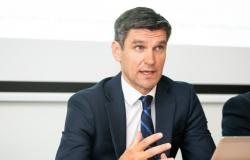
But the reservist points out that former NATO ground forces commander, Reserve Lt. Gen. Ben Hodges, is right about the need to be ready to stand alone for a period of time.
“What B. Hodges warns about not only in Lithuania, but also in other countries, is related to the 3rd article of the NATO treaty, which says that defense begins at home. We must be ready. I certainly won’t argue with Mr. Hodges about two weeks, it could be less, it could be more. But the fact is that Article 3 tells you to be ready to defend yourself first. Then you can create extra capabilities and help your allies. So it’s a very good approach: to do your best to be ready to defend yourself. And whether you will have to defend yourself alone or not, it will depend on the decision of the other parties,” Ph. said in an interview with tv3.lt. Breedlove.
During the debate on Thursday, you talked about the fact that the United States could unilaterally help NATO partners if Russia decides to launch an attack against one of the Alliance partners, before a political decision on the response to the aggressor has been made in the North Atlantic Council (NAC). Maybe you can tell about your idea in more detail, because you want to understand exactly.
Yes, I would really like to be understood correctly. The most important thing for NATO is to act, and for the North Atlantic Council to decide. But if the North Atlantic Council does not make a decision, all countries have the opportunity to respond by supporting a NATO partner. And what we saw was that the United States provided support to the Baltic countries during the first Russian invasion of Ukraine. It demonstrated that the United States sees its responsibility on a bilateral level to its allies. In that case, the US response came before the North Atlantic Council decision. And then other NATO countries followed the example of the US until, finally, the decisions were made by the council and all of NATO. So what I was trying to say is that the United States of America is free to act first and has done so in the past.
I asked this because your colleague, reserve lieutenant general Ben Hodges, who visited Lithuania, sparked a discussion that it is quite possible that our country should stand alone for two weeks in the event of a Russian attack, because during that time a political decision can be made at the NATO level regarding the response. So we are now internally debating how we must be prepared to endure.
Ben and I are good friends and I think his advice is very good because the North Atlantic Council will have to make a decision in any case and individual countries like the US will also have to make their own decisions. What B. Hodges warns about not only in Lithuania, but also in other countries, is related to the 3rd article of the NATO treaty, which says that defense begins at home. We must be ready. I certainly won’t argue with Mr. Hodges about two weeks, it could be less, it could be more. But the fact is that Article 3 tells you to be ready to defend yourself first. Then you can create extra capabilities and help your allies. So it’s a very good approach: to do your best to be ready to defend yourself. And whether you will have to defend yourself or not will depend on the decision of the other parties.
Are you surprised by Russia’s insistence on waging war in Ukraine despite financial, human and other losses? Russia has already reoriented its economy, it does not spare people at all, it is ready to make a lot of sacrifices.
Good question and one that has been asked many times at this conference. People say that Russia is ready to suffer. This is the Russian way of waging war, as the Western way relies more on high technology on the battlefield. Russia is ready for a war of attrition, that seems to be their way of waging war. So I guess I’m not surprised. I listen to people who know Russia much better than we do in America, they say that Russia is ready to suffer. This made me think that this is really not unusual for Russians. In a war of attrition, they drop people, they lose a lot of soldiers, but that’s really not the way the West fights. We are more inclined to fight a war of maneuver, to use technology on the battlefield. But, obviously, Russia is stuck in the mindset that we’re going to throw in as many people as we need to.
But the Western response to this is so debatable. Western countries seem to support Ukraine, but do not provide enough weapons, they do not even know how far Ukraine has to go, whether it has to defeat Russia, what will happen if Russia loses this war. How would you describe this process?
This is a huge problem. I believe we in the West are discouraged on some level. We have not decided to give Ukraine what it needs most to win, we seem to be giving less than it needs to win. A lot of people at this conference believe that it’s because a lot of people in the West, the big Western countries, can’t grasp or intellectually digest the image of a defeated Russia or a defeated Putin. We see that Putin and his upper-level circle in Russia are constantly threatening nuclear weapons, constantly threatening that this will become a much wider conflict. And, of course, it is always said that American soldiers will die on European soil. Thus, Putin is implementing a very good influence campaign and discouraging Western leaders from taking active steps that would allow Ukraine to win.
We have to make one principled decision – can we allow and ensure that Ukraine wins? Because if we give them what they need, they will win. They showed it around Kyiv, they showed it everywhere else. We in the West have to decide what we want in support of Ukraine. Now it does not seem that we have decided to ensure the victory of Ukraine.
What else do you think Ukraine should do to convince Western countries to provide all the necessary support for victory?
Ukraine is doing the most important work, it is fighting bravely, the people of Ukraine stand firm for themselves, they want Russia to disappear from all of Ukraine, including Crimea. Because Crimea belongs to Ukraine, not Russia, no matter what Putin says. I think the most important thing is that Ukraine continues to fight and people continue to support Ukraine.
There are countries that are very willing to talk about corruption in Ukraine. And I think that Ukraine publicly and very clearly fights against such phenomena. Sometimes I ask people, how long has Ukraine been trying to be democratic? Since the 1990s? It’s just over 30 years that they’ve been trying to build a democracy, so it’s natural that not everything works. My country has been trying to build a democracy for over 400 years and we have a problem with corruption, really high politicians are accused of corruption from time to time. I think we should be less critical of a young country trying to be a democracy.
I think that Ukraine must continue its reforms, it must clearly tell the Western countries what it needs, in general, Ukrainians have been very open about where the given money goes. This needs to be continued. But the most important thing is to continue the fight, show the spirit.
Here in Europe, we are thinking a little about what will happen if Donald Trump becomes the president of the USA again and if he decides to either withdraw from NATO formally or simply reduce the activity of the USA abroad and within the framework of NATO.
I don’t think any president can pull out of NATO on their own. Legally. As you know, there are three branches of government in the United States: there is the executive branch, which is headed by the president, then there is the legislative branch, which controls all funds, no matter what anyone thinks, and then we have the judicial branch, which is not very active in US politics anyway, but still influence and have an impact. So there are three branches of government, and none of them alone can make decisions like withdrawing from NATO.
Now the decommissioning part of the question is much more difficult because the president is a very important figure in our foreign policy. So he could influence how active we could be in NATO. But again, he alone cannot take action that Congress does not pay for. So Congress has the power to decide.
Mr. Trump is a former US president, and after four years of his presidency, NATO has held up well. When he was president, the Alliance survived and even improved. I am sure that no matter who is elected president, NATO will survive, and our activity in NATO will not change much.
Russia broadcasts to its domestic audience that NATO is here to attack Russia, that NATO is fighting against Russia in Ukraine, and so on. Do you think Russia is looking to go to war against NATO?
I don’t think so. And having said that, I think Putin saw how poorly prepared his armed forces were, how poorly they performed fighting only in Ukraine. He does not want to fight with NATO. I think all those stories you hear are about controlling and motivating your people. He needs a big bear, a big enemy, so he just takes NATO and the United States as enemies. Those messages are intended for an internal audience rather than an external one. I think Putin understands what a war with NATO would mean for Russia.
What if he succeeds in splitting NATO?
Well, he certainly tries it all the time. Every SACEUR understands that, first of all, you need to take care of the Alliance, you need to take care of military readiness, unity. But I don’t think that Putin’s goal is to beat NATO military forces, because he can’t do that, but he can successfully put sticks in circles, divide, look for weak leaders and try to take advantage of them. He will certainly use any means to split the Alliance. And we need to know that the most important thing is our unity and solidarity. We need to look at what unites us, not the little things that divide us.
Tags: commander NATO forces Europe spoke frankly Lithuania expect partners case war
-




